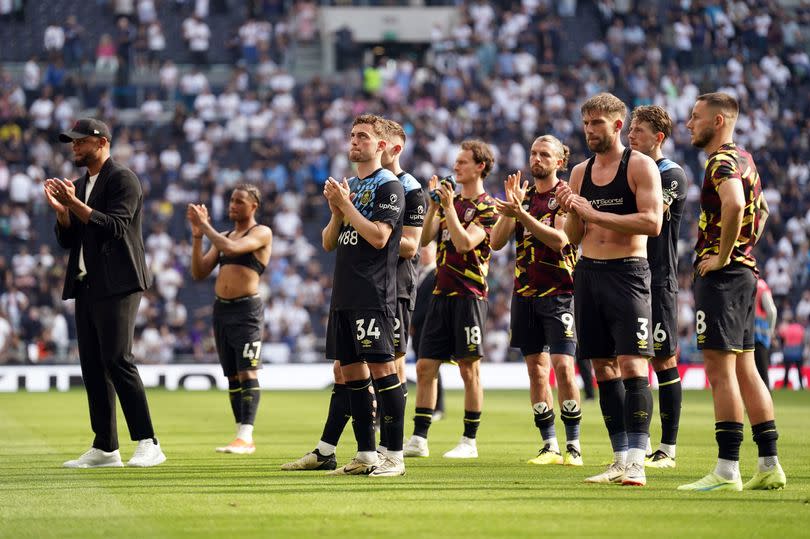Premier League relegation picture is a stark reality for Middlesbrough and the Championship

In failing to win promotion to the Premier League this season, Middlesbrough will spend an eighth season in the Championship next term. It's their longest period outside of the top flight in 50 years, when Jack Charlton's side ended 20 years without top-flight football by winning Division 2 in 1974.
Michael Carrick has already made clear that his aim next season is to win promotion, with the club's ambition to get themselves back to the Premier League clear. However, with their last promotion in 2016 under Aitor Karanka only good for a solitary campaign in the Premier League, the goal has to be to not only get up, but stay up too.
Boro are a finding that in an increasingly difficult financial climate, winning promotion is far from easy in itself - with the financial advantages afforded to teams relegated to the Championship in the form of parachute payments creating an imbalance. But getting up is only the first part of what is becoming an increasingly bigger gap to bridge, because the financial gulf between England's top two tiers means avoiding the dreaded fate of coming straight back down is becoming more and more difficult.
READ MORE: Michael Carrick's promotion aim and Middlesbrough 'excitement' is based on substance not hope
This weekend, Burnley's relegation from the Premier League was confirmed, while Luton Town's goal difference ahead of the final weekend means it will almost certainly be a clean sweep of the three sides that went up last term going straight back down, with Sheffield United's relegation already confirmed.
It's a stark reality check for Boro and every other Championship side hoping to reach the Premier League and the challenges they ultimately face - particularly when considering how comfortable Burnley secured promotion last term. Even in the unlikely scenario all three sides win their final games this weekend, it is guaranteed to be a record-low collective points tally for the three promoted sides this term. Currently on 66 points, that's 19 points worse off than Sunderland, Birmingham and Derby County achieved in the previous record low from 2007-08.
While every circumstance is unique to that individual club, there's another statistic that should concern Boro, as they look to bridge that gap minus the help of parachute payments. In the last five seasons, only three clubs have gone up without being backed by the solidarity payments, and then avoided relegation in their first season. The gap's already big, but bigger still for clubs like Boro, who can't afford to carry squads that are at least heavily subsidised enough to require less work upon a top flight return.
Of those three to bridge the gap, Nottingham Forest have ultimately stayed there thanks to a splurge of cash that has seen them fall foul this year of the Premier League's profit and sustainability rules. You might call that bad recruitment, but it also highlights the kind of money needed to add the quality necessary to stand a chance of being competitive.
Deserving far more credit though, and using the kind of recruitment methods that Boro are hoping will help them are Brentford and Brighton - clubs often held up as the example for most to follow now. For both, it took time to work their way into the positions they're in now. Astute recruitment and believing in the process over the long term were key.
While that has to be the goal for Boro, the harsh realities of life in the top flight for last season's promoted trio are a reminder of just how difficult the task they face is. It should be a warning for all involved in the English game, as the Premier League and EFL continue to struggle to come to a new arrangement with regard to the distribution of finances being drip-fed down the pyramid.
Until a new agreement is reached - mutually or eventually from the help of a new independent regulator - for every year that clubs like Boro are outside of the top flight, the financial gap that Premier League sides build grows and grows. It makes the promotion-relegation challenge all the more insurmountable for the majority of Championship clubs.
There was widespread anger among football fans when six clubs tried to break away and be part of the formation of the European Super League - a competition that, like the American sports that most of their owners are more accustomed to, would have guaranteed continued participation for those clubs, rather than merit-based qualification.
The idea of relegation and promotion is fundamental to the English culture of sport - places in competitions are earned rather than given. But so many of the Premier League clubs are now owned by American businesses and people whose best interests it is to keep their sides in the top flight. While a move to align with America in a closed-shop style system would likely be met with fierce backlash from football fans, what we shouldn't be complacent to is the very real possibility that the financial division within the game now could ultimately create such a scenario by proxy.
Football is all about hope. For the time being, that still exists for English clubs outside of the Premier League who continue to chase that dream. Once again, we'll have that at Boro this summer heading into the new season too: This year could be our year.
The reality, however, is that the task becomes harder and harder with every passing year, and it's a problem that English football needs to collectively solve to protect the pyramid in the long term.

 Yahoo News
Yahoo News 
